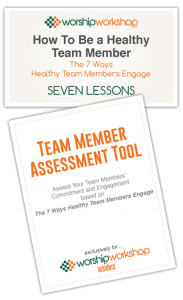Working Backwards
Do you ever hear this comment from your team members after your second (or third) service?
"Wow, things finally came together for that last service.”
In an ideal world, the first service would be as polished as the last. But let’s face it: by the time we get to our second or third service of the weekend, the band IS better.
While we don’t care to admit to it, we essentially make our first service a “dress rehearsal."
I recognized this issue several years back. I started asking myself, "Why aren't we as prepared for the first service as we’d like?"
So I started working backward:
Why is the second service the most polished service?
Well, we’ve had a chance to run all the songs, transitions and other elements during the first service.
So why aren’t we as prepared for the first service?
I guess we’re not getting in a full run-through during the pre-service warm-up time.
So why aren’t we getting a full run-through then?
It seems we’re still working out the songs and transitions.
So why are we still working out the songs and transitions during warm-up?
I guess we didn’t fully tackle those pieces during rehearsal.
So why don’t we work out the songs and transitions during rehearsal?
I think because people are still learning their parts for each song.
So why are people learning their parts at rehearsal?
Because they’re not practicing enough at home.
We’re practicing at rehearsal.
Get Your Worship Team To Practice (BEFORE Rehearsal)
When that finally clicked for me, I knew we had to start making personal preparation more of a priority. But it wasn’t just a behavioral change that we were looking at.
It was a culture change.
And the current culture of the team was this: Don’t bother learning songs at home because we work on them at rehearsal.
So I started a multi-year journey to change that culture. I knew we had to have a total shift in how we viewed practice and rehearsal.
While there were other things I did, here are three key tactics I used to get the team to stop practicing at rehearsals.
1. I stopped calling rehearsal “practice.”
I used the word “rehearsal” every opportunity that I got to refer to our mid-week preparation time (whether in verbal or written communication).
2. I created a mantra.
OK, that sounds weird. But I knew that to help create lasting change, I had to make the picture of the preferred future short and memorable. So I came up with this statement:
"Practice is personal; rehearsal is relational."
As we fleshed this statement out as a team, we begin to understand that if a team member neglects his/her personal preparation time then that affects the whole group.
When we stop and work out an individual’s part that wastes the time of people who prepared at home. This statement helped us build relational accountability into our culture.
3. I stopped listening to songs at rehearsal.
Typically, if someone didn’t know their part or were unclear about the form, we’d stop rehearsal and listen to the recording.
It was a common occurrence almost every week. So I finally told the team we weren’t going to listen to the recording of the song at rehearsal anymore.
This was a clear and tangible call to something different. I remember the first few times I said “no” when people asked if we could stop and listen to the song.
You’d think I had kicked their puppy.
But I held firm. It communicated to them this: “Learning the song needs to happen before rehearsal.”
Now there’s been several times where we were all stymied by a part of the song and had to go back to the recording during rehearsal. But it gave me a chance to admit I that hadn’t prepared like I should have and apologize for wasting the team’s time by my poor preparation.
Fast Forward
So now, fast-forward a few years and I have a much different culture on my team. I wish I could say we’ve fully arrived. But every so often I realize we’ve drifted and a course correction is needed.
But these three tactics continue to move us towards our preferred future of truly valuing preparation.
 If you’d like to explore how to get your team more engage in EVERY area of ministry (not just practice and rehearsals) take your team through the free class, How To Be A Healthy Team Member, plus the free assessment tool.
If you’d like to explore how to get your team more engage in EVERY area of ministry (not just practice and rehearsals) take your team through the free class, How To Be A Healthy Team Member, plus the free assessment tool.
We explore seven areas where team members need to be engaged. And being prepared is falls under at least two of those engagement areas: Engaged With The Music and Engaged With The Process.
Email matt@worshipteamcoach.com to receive your training kit.
A version of this article appeared as "Stop Practicing At Rehearsals" in the Worship Musician Magazine's November/December 2015 issue.
Stuck?
Learn how to level-up your team with this free video training.







